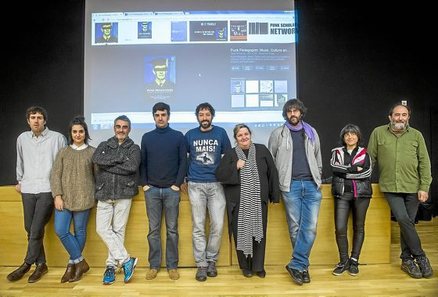Music, party, roots, (counter)culture, resistance, identity, popular music… We talked about all this and more at the “Kantatzen duten herriak” (“Nations That Sing”) conference held at the University of the Basque Country (UPV/EHU) from December 18th to December 20th. The first two days we organized seminar sessions at the School of Social Sciences and Communication, and the third we hosted a public lecture and a round table at the School of Education. The event was sponsored by the Punk Scholars Network (Iberia) and the NOR and IkasGura research groups.
The first day, Ainara Santamaria presented on Mikel Laboa’s cultural heritage, highlighting the magical connection he established between traditional Basque music and cultural experimentalism. Among other things, Santamaria posed questions such as whether we have lost the capability for experimentalism nowadays, or whether we are stuck at viewing music still through the eyes of the sixties. Andoni Fernández, for his part, presented his self-produced book Mierda de Bizkaia studying the demos published by several punk bands from Bizkaia during the eighties. David Mota spoke about the pressure, threats, and censorship, suffered by different bands in the Spanish state during the nineties. Mikel Izarra, introduced the always controversial topic of the Basque independentist left co-opting the RRV (Basque Radical Rock) through “Martxa eta Borroka” (“Party and Fight”) campaing: did the Basque independentist left help create a cultural frame in which bands were accepted or rejected depending on their political ideas? Finally, Patxi Gaztelumendi looked at the heritage of Mikel Laboa and the RRV in order to move forward and envision new ways of articulating a contemporary cultural and political movement; In other words, he tried to understand what we could learn from them to look forward and not simply to understand the past.
The second day, we had various visitants from differents countries. From Madrid, Josemi Pérez presented on the evolution of pirate radios in the Spanish capital, and David Álvarez spoke about the music and fanzines developed within the Madrilenian punk scene. After this, Carmen Torre, researcher at the University of Pennsylvania and a native of Santander (Spain), introduced us into the fascinating world of Cuban punk. Next, Jakue Pascual, a first-hand informant of the Basque punk scene of the eighties, explained thoroughly its origins and development. Then, Edu Leste, also from Madrid, introduced a topic that created a very interesting debate among the audience: the risks of memories of past subcultures becoming reactionary nostalgic mindframes that reject the revolutionary potential of new subcultures because “back in the day everything was better.” Finally, Paula Guerra, professor and researcher from the University of Porto, reflected on post-crisis artivism in Portugal. The final discussion was so interesting that we almost forgot to have lunch and made it to the cafeteria right when they were about to close!
We began the third day with Paula Guerra’s public lecture on punk and education and a discussion on the content of the collective book Punk Pedagogies: Music, Culture, and Learning. After Guerra’s presentation, we had a round table with different people involved with music in different ways. Musicians such as Alex Sardui, singer of Gatibu, the rapper La Chula Potra, the DJ and electronic music producer Aitor Etxebarria (El_Txef_A); researchers such as Josu Larrinaga and Ion Andoni del Amo (UPV/EHU); Adrián Medrano, a cultural organizer (Fever, Bullit); and Leire Palacios, a music journalist. We talked about the Basque music scene both in the past and nowadays, about what is and what isn’t Basque music, the differences between audiences of different ages, public funding for festivals and music events, and many other things. The newspaper GARA wrote an article describing the event of this last day:
Keep dancing!

